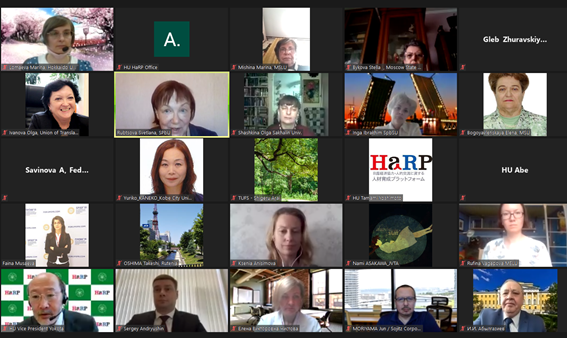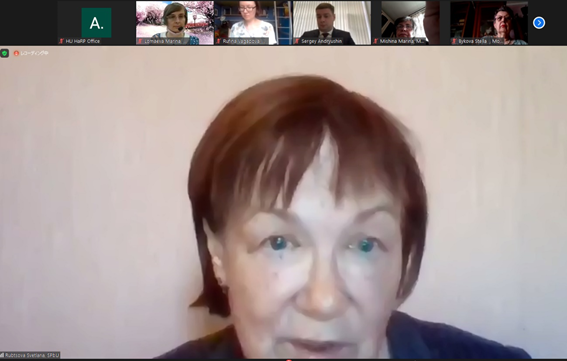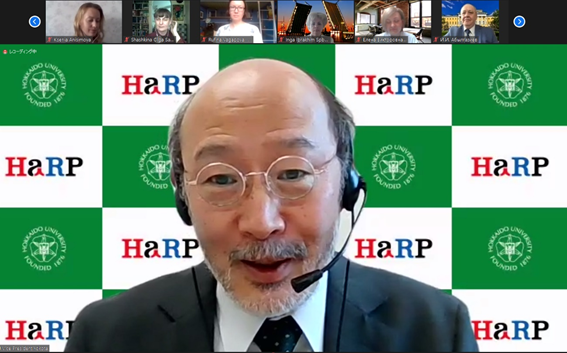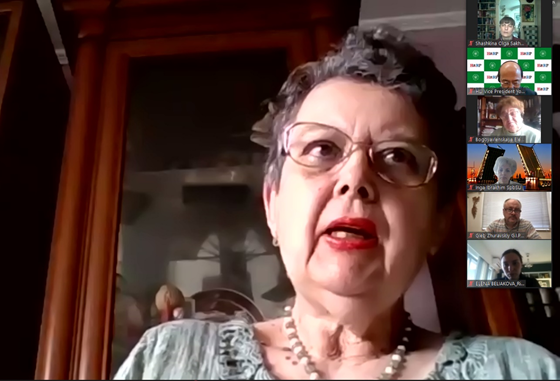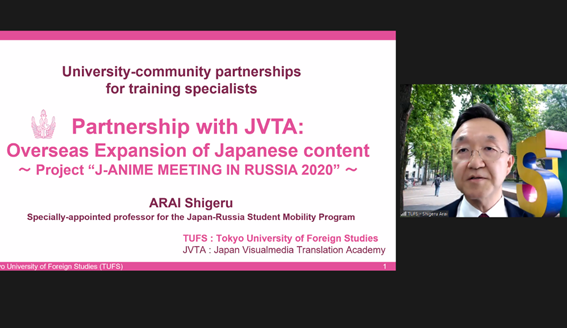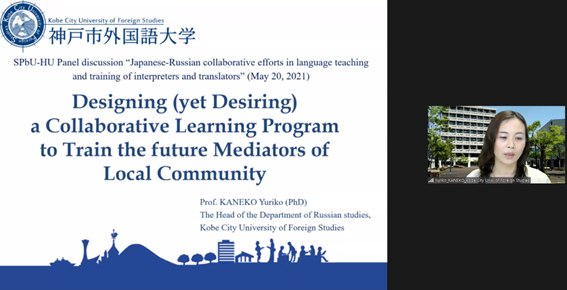On May 20, Hokkaido University collaborated with St. Petersburg State University (SPbU) and the Association of Japanese and Russian Universities to host a round table conference “Japanese-Russian Collaboration on Training Interpreters/Translators and Language Teaching.” This event was held as part of the MEXT Inter-University Exchange Project: Support for Inter-University Exchange with Russia and Other Countries, for which Hokkaido University and Niigata University successfully applied together. Following the conference on the same theme held by the Hokkaido University HaRP Secretariat on February 21, 2020, this conference gathered over 80 people, including participants of the HaRP’s specialized section on Language, Culture and Tourism, 20 faculty and staff members from 11 Japanese universities (including 9 from Hokkaido University), 36 faculty and staff members from 18 Russian universities, 3 Japanese and Russian students, and 13 staff members and active interpreters from 10 private Japanese and Russian companies (involved in language services, language education, consulting, etc.).
The event began with opening remarks from Svetlana Rubtsova, Dean of the Faculty of Foreign Languages, SPbU, and Atsushi Yokota, Executive Vice President of Hokkaido University. They were followed by keynote speeches delivered by Nikolai Kropachev, Rector of SPbU (read by Deputy Rector Andryushin), Igor Abylgaziev, Acting Director of the Institute of Asian and African Studies, Moscow State University, and Stella Bykova, Head of the Department of Japanese Philology at the Institute of Asian and African Studies, Moscow State University.
After the keynote speeches reports were presented by Inga Ibrakhim, Associate Professor of the Department of Oriental Studies at SPbU; Elena Chistova, Head of the Department of Oriental Languages at Siberian Federal University; Olga Shashkina, Associate Professor of Sakhalin State University; Alina Savinova, Director of the Russian-Asian Exchange Center at Astrakhan State University, and Alina Fedorovich from the same Center; and Marina Mishina, Professor of Moscow State Linguistic University. Their talks were on teaching methods for interpretation and translation, the development of teaching materials, online educational technology, and joint projects with companies. Specific examples of industry-academia collaboration were presented, such as the university calling for the cooperation of language service companies to jointly develop professional standards and modify the content of the training courses for interpreters and translators according to these standards, and a human resource company commissioning the development of a Japanese language course for IT specialists.
On the Japanese side, Shigeru Arai, Professor of Tokyo University of Foreign Studies, spoke about “J-Anime Meeting in Russia 2020,” a joint project with Japan Visualmedia Translation Academy (JVTA) as well as the activities of Japanese and Russian students in this project (anime selection, subtitle translation, PR, approaching potential sponsors, etc.), while Yuriko Kaneko, Professor of Kobe City University of Foreign Studies introduced an internship program for Russian language students to translate academic papers from Russian to Japanese, a volunteer interpretation program for international events, a student contest for Japan-Russia municipal exchange, and a project to train coordinators to support local communities.
In addition to the presentations about the training of language professionals, representatives of the Association of Translator and Interpreter Teachers and Interpretation and the Union of Translators of Russia gave an overview of their respective organizations’ activities and shared the latest information on the development of professional standards for interpreters and translators and the revision of the licensing system for interpreter guides. Furthermore, representatives of three Japanese and Russian companies (Gleb Zhuravskiy, Representative Director of the Japanese company G.I. PLAN Co. Ltd., Alexey Kozulyaev, General Director of the Russian video translation company RuFilms, and Ms. Yankovskaya, HR Manager of the translation company Literra) spoke from the employer’s point of view on the fields of interpretation and translation that are particularly in demand today, the skills expected from language professionals, training and internships, and the demands for professional standards.
The participants expressed appreciation for the opportunity to have discussions with people from universities, companies, and industry groups all at the same event and learn about innovative teaching methods and approaches developed by each university, and also because of the diversity of presentation topics. Participants also indicated that if future events in this field were to be held, it would be beneficial to provide a venue for the exchange of information on practical aspects such as the job market in Japan and Russia, qualifications, media literacy for translators and interpreters, the use of the latest information technology including AI, and conditions for accepting internships.
We hope that this event will serve as an opportunity to develop collaboration projects between industry, academia, and government agencies and networking among researchers and practitioners in the field of linguistics, and to create new partnerships.
